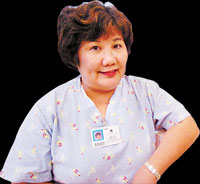Warning: include(/www/specials/filipino100/header.php): failed to open stream: No such file or directory in /srv/users/thaarchives/apps/thaarchives/public/specials/filipino100/ramones/index.php on line 1
Warning: include(): Failed opening '/www/specials/filipino100/header.php' for inclusion (include_path='.:/opt/sp/php7.4/lib/php') in /srv/users/thaarchives/apps/thaarchives/public/specials/filipino100/ramones/index.php on line 1
 |
 |
|
|
JOAQUIN SIOPACK | The Honolulu Advertiser |
|
|
| Birthplace: Waialua
Family: Mother, Florenda Ramones, 81
First Filipino family member to live in Hawai'i: Paternal grandfather, Tomas Ramones, came to Hawai'i in the 1930s to work on a sugar plantation
Occupation: Registered nurse and facility manager at the Leeward and Wai'anae dialysis units of St. Francis Medical Center, and president of the Philippine Nurses Association-Hawaii
Hobbies/pastimes: Traveling
Favorite Filipino food: Desserts, including sweetened rice cakes called kakanin and puto, and leche flan
|
|
|
|
|
|
|
By Zenaida Serrano
Advertiser Staff Writer
Emilyn Ramones' parents devoted nearly 40 years to O'ahu's agricultural industries, and their work ethic is something Ramones has admired all her life.
Her father, the late Bruno Ramones, was an irrigator for Waialua Sugar Co. On his days off, he earned extra money doing yard work.
Her mother, Florenda, 81, worked as a pineapple trimmer for Dole and a seamstress, among other jobs.
"Both my mom and dad were really hard workers and they instilled that in us, to work hard and get an education so that we didn't have to work like they did," said Ramones, a registered nurse at St. Francis Medical Center. "I think all Filipino families instill that in their children."
Ramones' parents immigrated to O'ahu from their homeland in Ilocos Norte, Philippines, in 1946.
Ramones' father made the journey first, leaving behind his young wife.
"He was kind of reluctant to come because he thought they might separate," Ramones said. "But Mom said to come here and try, and then she'd come along."
Bruno Ramones, then 24, followed the footsteps of his father, Tomas Ramones, who came to Hawai'i in the 1930s.
After working in the canefields of Waialua for a short time, the elder Ramones returned home to his family in the Philippines, but he worked long enough to make an impression on his plantation peers.
"My dad would say that older people would tell him, 'Oh, your dad was a really hard worker,' " Ramones said.
Within a year, Florenda Ramones joined her husband.
"I remember her talking about coming in on a ship and it was a long trip and some of them got really sick," Ramones said.
The couple settled in Waialua, which was divided into plantation "camps," ranging from a Japanese camp to a Portuguese camp. Ramones recalls living in a Spanish camp, although residents were mostly Filipino.
"It was very different, very close-knit compared to now," said Ramones, who lives in the North Shore community today. "I kind of miss all that."
Like many locally born and raised children of Filipino immigrants, Ramones struggles to find a true connection to her Filipino culture and feels "in the middle," said Ramones, a soft-spoken woman in her 50s.
She and her younger brother grew up in a household where Filipino customs weren't pushed and English was encouraged, although her parents spoke to each other in Ilocano, a Filipino dialect.
"I only understand (Ilocano), but I can't speak it," she said.
Ramones attended Waialua elementary and intermediate schools. At 13, Ramones volunteered at Wahiawa General Hospital as a candy striper, making beds, wheeling patients around the facility and helping feed them.
The job satisfied Ramones' desire "to help others" and opened her eyes to a career in nursing.
When she graduated from Waialua High School, her parents had put away enough money to send their daughter to college.
"They were good savers," Ramones said.
She earned an associate's degree in nursing from the University of Hawai'i-Manoa, followed by a bachelor's degree in nursing from the University of Phoenix.
Ramones has been a nurse for nearly 30 years, working at Kuakini Medical Center, St. Francis Medical Center and Tripler Army Medical Center. She also spent a year at UCSF Medical Center at Mount Zion in San Francisco.
Today Ramones is a facility manager at the Leeward and Wai'anae dialysis units of St. Francis Medical Center, and president of the Philippine Nurses Association-Hawaii. The five-year-old local chapter, with about 40 members, serves as a support and networking organization for Filipino nurses.
Ramones, who enjoys traveling in her spare time, visited her parents' homeland in 1995.
"So I got to see my roots," Ramones said. "It was an eye-opener for me."
Ramones said she is grateful for the sacrifices her parents made to give her the life she has today and for the lasting lessons they've passed on to her.
"If you worked hard and studied hard, your opportunities would be much, much better," she said.
Warning: include(/www/specials/filipino100/footer.php): failed to open stream: No such file or directory in /srv/users/thaarchives/apps/thaarchives/public/specials/filipino100/ramones/index.php on line 100
Warning: include(): Failed opening '/www/specials/filipino100/footer.php' for inclusion (include_path='.:/opt/sp/php7.4/lib/php') in /srv/users/thaarchives/apps/thaarchives/public/specials/filipino100/ramones/index.php on line 100

